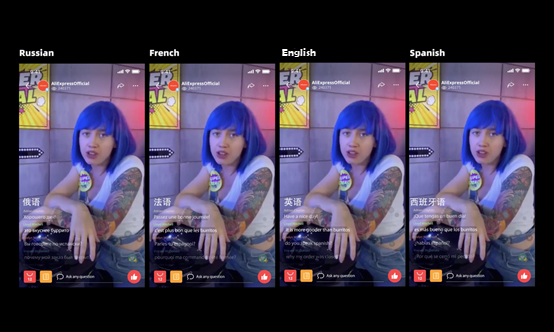The Alibaba Cloud 2021 Double 11 Cloud Services Sale is live now! For a limited time only you can turbocharge your cloud journey with core Alibaba Cloud products available from just $1, while you can win up to $1,111 in cash plus $1,111 in Alibaba Cloud credits in the Number Guessing Contest.
On October 21, Alibaba broadcasted the world's first e-commerce livestream with real-time translation for multiple languages. The livestream showed that AI can accurately translate Chinese into English, Russian, Spanish, and other languages in real-time in environments, capable of dealing with noisy disturbances, regional accents, and colloquial language or slang. Alibaba planned to use this technology on a large scale during the 2020 Double 11 Global Shopping Festival.

DAMO Academy AI can translate languages during the livestream and in the comment section in real-time.
Language is often a challenge between merchants and consumers in different regions. According to the data, about 96% of small and medium-sized enterprises in AliExpress have no translation ability when it comes to minority languages. As a result, 82% of Chinese businesses have to abandon cross-border live broadcasts.
Although AI can assist with text translation, live streaming scenarios require more complex translation tasks. In live streaming scenarios, the AI needs to recognize voices, translate them in sequence, and overcome difficulties, such as non-standard accents, colloquial expressions, noisy environments, commodity terms, new products, and new names. For example, this sentence uses colloquial language, "然后我们的话新品大家的评价也看了." The correct translation should be, "Then, we have read everyone's comments on new products." However, traditional translation engines often mistakenly translate it as, "Then, we also looked at our comments on new products." (然后我们也看了我们对新品的评价)
To resolve issues that machines cannot hear or understand clearly, Alibaba has developed a more intelligent in-house voice model based on a general model used in the industry. This voice model allows machines to hear and understand live content in noisy environments. By innovatively integrating the recognition results of visual information in the translation process, the AI can rewrite colloquial sentences into formal expressions. In addition, DAMO Academy inserts multi-domain knowledge into translation models, so machines can quickly learn the updated terms in different scenarios without re-training.
Over the past few years, Alibaba's AI translation technology has undergone many iterations and upgrades. Now, it provides high-quality translations in 214 languages and translates 300 billion words daily. Moreover, this translation technology has set many world records, including the championship for inter-translation in five languages and machine translation quality estimation in six languages at the 2018 Conference on Machine Translation (WMT). The top international AI conference showcased results from 30 related research papers. This technology was gradually applied to the internal and external enterprises of Alibaba, with more than 1.3 billion calls per day.
Luo Weihua, Director of the Machine Translation Team at Alibaba DAMO Academy, said, "Making machines heard and understood clearly is the foundation for accurate translation." DAMO Academy hopes to continue to helping everyone overcome language barriers and conquer translation issues in specialist fields, such as e-commerce, education, and medical, with the innovative AI algorithm.
Alibaba Cloud Enables Five Super Data Centers to Support Double 11

2,593 posts | 792 followers
FollowAlibaba Clouder - December 1, 2020
Alibaba Clouder - December 2, 2020
Alibaba Clouder - April 8, 2020
Alibaba Clouder - November 27, 2019
Alibaba Clouder - November 22, 2019
Alibaba Cloud Community - October 15, 2025

2,593 posts | 792 followers
Follow Black Friday Cloud Services Sale
Black Friday Cloud Services Sale
Get started on cloud with $1. Start your cloud innovation journey here and now.
Learn More Offline Visual Intelligence Software Packages
Offline Visual Intelligence Software Packages
Offline SDKs for visual production, such as image segmentation, video segmentation, and character recognition, based on deep learning technologies developed by Alibaba Cloud.
Learn More Intelligent Robot
Intelligent Robot
A dialogue platform that enables smart dialog (based on natural language processing) through a range of dialogue-enabling clients
Learn MoreMore Posts by Alibaba Clouder